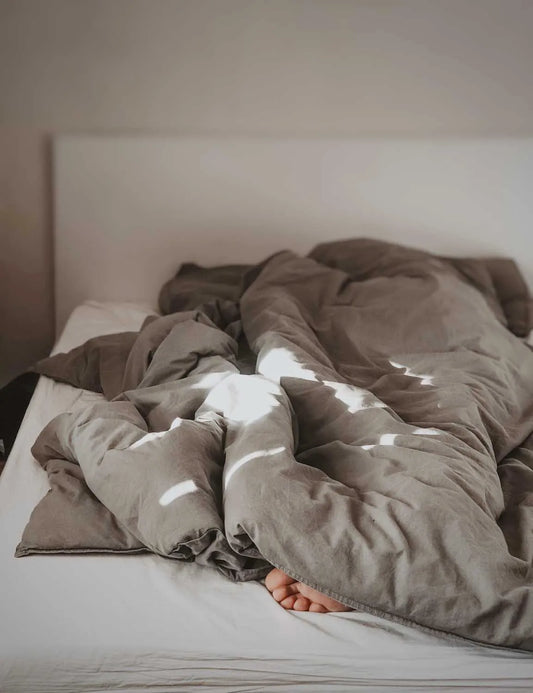Dive into the intriguing topic of sleep and exercise as we explore the best time to work out for optimal rest. At Remly Sleep, we're dedicated to leveraging research for product development, and The Dream Lab is our way of sharing the knowledge we gain with you.
The Connection Between Sleep and Exercise
Exercise is essential for maintaining good health, and it plays a vital role in ensuring restful sleep. Regular physical activity can help improve sleep quality, enhance mood, and reduce stress. Let's explore the relationship between sleep and exercise to better understand how to make the most of your workouts.
Benefits of Exercise for Sleep
- Reduces stress and anxiety
- Improves sleep quality
- Increases sleep duration
- Helps regulate circadian rhythms
- Boosts mood and overall well-being
Regular exercise has been shown to have a positive impact on mental health, including reducing symptoms of anxiety and depression. In addition, exercise can help increase the release of endorphins, which are natural mood elevators. These benefits contribute to a better night's sleep by promoting relaxation and reducing stress levels. Exercise also plays a crucial role in regulating our circadian rhythm, the internal clock that controls our sleep-wake cycle. Regular physical activity can help synchronize this rhythm, leading to improved sleep quality and duration.
How Much Exercise is Enough for Better Sleep?
The amount of exercise needed to improve sleep varies from person to person. The American Heart Association recommends at least 150 minutes of moderate-intensity aerobic exercise or 75 minutes of vigorous aerobic exercise per week, spread out over at least three days. Regular physical activity, whether it's walking, running, swimming, or yoga, can contribute to better sleep quality and overall well-being.
It's essential to find the right balance of exercise that works best for you. Factors such as age, fitness level, and personal preferences can all play a role in determining the optimal amount of exercise for improving sleep quality. Listening to your body and adjusting your exercise routine accordingly is key to reaping the full benefits of physical activity for sleep.
Best Time to Exercise for Optimal Sleep
While exercising is essential for good sleep, the timing of your workout can impact your rest. There is no one-size-fits-all answer, but understanding the different factors involved can help you determine the best time for you to exercise.
Morning Workouts
- Can increase alertness and energy throughout the day
- Helps regulate the body's internal clock
- May lead to more consistent workout routines
Exercising in the morning can be beneficial for several reasons. First, morning workouts can help increase alertness and energy for the rest of the day. This boost is largely due to the increase in endorphins, often referred to as the 'feel-good' hormones, that are released during exercise. This can set a positive tone for the rest of your day, potentially leading to increased productivity.
Secondly, morning exercise can help regulate your body's internal clock, or circadian rhythm. Light is the primary cue for this rhythm, but physical activity can also play a role. Working out in the morning can signal your body that it's time to wake up and start the day. This can lead to more consistent sleep patterns, which in turn can improve sleep quality.
Lastly, people who exercise in the morning may find it easier to maintain a consistent workout routine. Morning workouts are less likely to be disrupted by unexpected events or obligations that might arise later in the day. Having a consistent routine can not only aid in regular sleep patterns but also ensure you're getting the recommended amount of weekly exercise.
Afternoon and Evening Workouts
- Can help reduce stress after a long day
- May be more convenient for many people
- Can potentially disrupt sleep if done too close to bedtime
Working out in the afternoon or evening can also have its benefits. For one, it can be a great way to decompress and manage stress after a long day. Exercise releases endorphins, which can help you feel more relaxed and happier, possibly leading to improved mood and sleep. Afternoon workouts can also be more convenient for many people.
If you're not a morning person or your schedule doesn't allow for morning workouts, exercising in the afternoon or evening can be a good option. However, it's important to note that exercising too close to bedtime may disrupt your sleep. This is because exercise increases your body's temperature and heart rate, which can interfere with your ability to fall asleep. As a general rule of thumb, try to finish exercising at least 1-2 hours before you plan to go to bed to give your body time to wind down.
Factors to Consider When Choosing the Best Time to Exercise
- Your personal schedule and lifestyle
- Your energy levels at different times of the day
- The type and intensity of the exercise you prefer
- How exercise impacts your sleep quality
Choosing the best time to exercise can depend on various factors. Your personal schedule and lifestyle are likely the most critical aspects to consider. If you're a morning person, you might find it easier to stick with a morning workout routine. Conversely, if you're more of a night owl, an evening workout might be more suitable.
Your energy levels at different times of the day should also be taken into account. Some people might find that they have more energy in the morning, while others might find that their energy peaks in the afternoon or evening.
The type and intensity of the exercise you prefer can also influence when you should work out. For example, high-intensity workouts might be better suited for times when you have the most energy, while low-intensity exercises like yoga or walking can be done at any time of the day.
Lastly, you should consider how exercise impacts your sleep quality. If you find that working out in the evening makes it difficult for you to fall asleep, it might be better to exercise earlier in the day.
Tips for Incorporating Exercise into Your Sleep Routine
- Develop a consistent workout schedule
- Select the right type of exercise for your sleep needs
- Adjust workout intensity based on the time of day
- Establish a relaxing bedtime routine that includes winding down after exercise
Incorporating exercise into your sleep routine can be a highly effective way to improve your sleep quality. Here are some tips to help you get started:
Firstly, try to develop a consistent workout schedule. Consistency is key when it comes to exercise and sleep. By working out at the same time every day, you can help regulate your body's internal clock, leading to improved sleep.
Next, select the right type of exercise for your sleep needs. If you find that high-intensity workouts leave you feeling energized, you might want to schedule these workouts for the morning or early afternoon. On the other hand, if low-intensity exercises like yoga or walking help you relax, these might be better suited for the evening.
Additionally, you can adjust your workout intensity based on the time of day. If you're working out in the morning, you might choose to do a more vigorous workout to jumpstart your day. If you're exercising in the evening, a more relaxing workout might be more beneficial to help you wind down before bed.
Lastly, establish a relaxing bedtime routine that includes winding down after exercise. This can include activities like reading a book, taking a warm bath, or practicing mindfulness or meditation. If you're exercising in the evening, ensure you have enough time to cool down and relax before you try to fall asleep. This can help your body transition into sleep mode, improving your overall sleep quality.
Conclusion
Overall, the best time to exercise depends on your personal preferences, schedule, and how exercise impacts your sleep. While there are benefits to both morning and evening workouts, the most important thing is to choose a time that works best for you and your lifestyle. By maintaining a consistent exercise routine and incorporating it into your sleep schedule, you can reap the numerous benefits of physical activity, including improved sleep, increased energy levels, and better overall health.
Remember, any exercise is better than no exercise. So, even if your schedule only allows for a short workout, or if you can only fit in a workout at a less-than-ideal time, it's still beneficial to get moving. Listen to your body, adjust as needed, and find a routine that suits your needs and supports your health.
Thank you for exploring with us at The Dream Lab. Remly Sleep is on a mission to make you sleep better by sharing the latest sleep research and incorporating this knowledge into our innovative products. We're excited to journey together and discover more insights on sleep and well-being.




